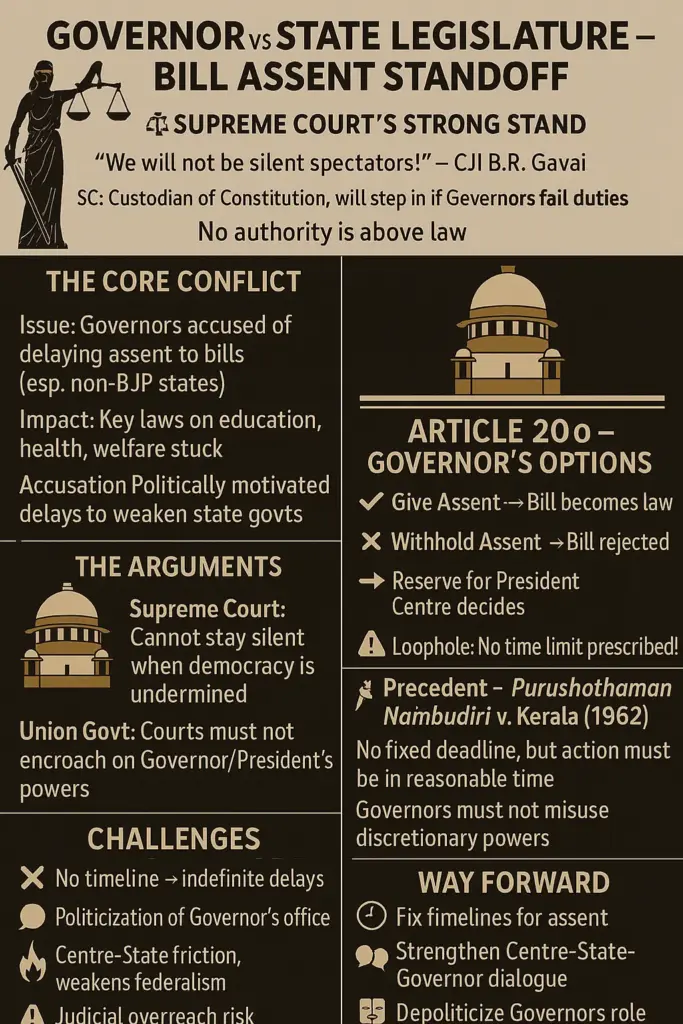September 12, 2025
Governor’s Assent: A Shocking Failure Explained in 4 Key Challenges
Purushothaman Nambudiri vs State of Kerala (1962)
The Supreme Court, led by Chief Justice of India (CJI) B.R. Gavai strongly observed that it will not remain a silent spectator if a constitutional authority like a Governor fails to discharge his duties. This remark came during the hearing of a Presidential Reference related to the prolonged delays by Governors in granting assent to crucial bills passed by State legislatures, especially in non-BJP-ruled States.

KEY POINTS: Purushothaman Nambudiri vs State of Kerala (1962)
Issue at Hand:
- There is growing tension between State governments and Governors over delays in clearing bills, including important welfare and policy laws.
- Several non-BJP-ruled States have accused Governors of politically motivated inaction.
- The matter was referred to the Supreme Court through a Presidential Reference for constitutional interpretation.
Supreme Court’s Observation:
- CJI B.R. Gavai emphasized that no constitutional authority is above the law, regardless of their position.
- The Court is the custodian of the Constitution and will intervene if other wings of democracy fail to perform their duties.
- Highlighted the doctrine of separation of powers, stating that while judicial activism should not become judicial overreach, the Court cannot remain powerless.
Union Government’s Argument:
- The Centre argued that the judiciary must not interfere in the functioning of Governors or the President, as these are executive powers.
- Warned against judicial encroachment into the domain of the executive and legislature.
Context of the Case:
- Dispute arises from Governors withholding or delaying assent to bills related to critical sectors such as education, health, and welfare schemes.
- Some States claim this undermines federalism and State autonomy under the Constitution.
LEGAL BACKGROUND
- Article 200 (Assent to Bills):
A Governor can:
- Give assent,
- Withhold assent,
- Reserve the bill for President’s consideration, or
- Return the bill for reconsideration (only once).
The Constitution does not prescribe a time limit, leading to indefinite delays.
- Judicial Precedents:
- In earlier cases like Purushothaman Nambudiri vs State of Kerala (1962), the Court upheld that Governors must act in a reasonable time.
- The Court has previously directed Governors to avoid political misuse of their discretionary powers.
CHALLENGES IDENTIFIED
- Absence of a clear timeline for Governors to act on bills.
- Increasing politicization of the Governor’s role, especially in opposition-ruled States.
- Federal tensions between the Centre and States.
- Risk of judicial overreach if courts directly order Governors to act.
WAY FORWARD
- Parliament or the Supreme Court could lay down guidelines or timelines for Governors to act on bills.
- Strengthen cooperative federalism through dialogue between the Centre, States, and constitutional authorities.
- Ensure that the Governor’s office remains apolitical and functions in the spirit of the Constitution.
- Possible constitutional amendment to clearly define Governor’s responsibilities and timelines.
September 9, 2025
September 8, 2025
September 4, 2025
September 1, 2025
